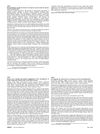 254 citations,
September 2014 in “Menopause”
254 citations,
September 2014 in “Menopause” The NAMS 2014 recommendations guide healthcare providers on treating health issues in midlife women, emphasizing individualized care and informed decision-making.
 101 citations,
April 1994 in “Baillière's clinical endocrinology and metabolism”
101 citations,
April 1994 in “Baillière's clinical endocrinology and metabolism” 5α-reductase is essential for male sexual development and its inhibitors have potential in treating various conditions related to hormone action.
 17 citations,
April 2006 in “Dermatologic Clinics”
17 citations,
April 2006 in “Dermatologic Clinics” Older women face various skin issues like dryness and thinning, and treatments are available but can have side effects; proper skin care and legal health decisions are important.
 7 citations,
September 2017 in “Biomedical and Pharmacology Journal”
7 citations,
September 2017 in “Biomedical and Pharmacology Journal” Growth factors greatly affect hair loss, with different levels seen in men, women, younger patients, and at the start of the condition.
 4 citations,
January 2018 in “International Journal of Trichology”
4 citations,
January 2018 in “International Journal of Trichology” A rare genetic disease causes sparse hair and early blindness due to a gene mutation.
 3 citations,
January 2019 in “International Journal of Trichology”
3 citations,
January 2019 in “International Journal of Trichology” The article concludes that treating hair loss requires careful research, understanding the causes, and personalized treatment plans.
 October 2024 in “Frontiers in Nutrition”
October 2024 in “Frontiers in Nutrition” Vitamin D deficiency is common in people with certain types of hair loss, like alopecia areata and female pattern hair loss.
 May 2020 in “Jurnal Penelitian Perawat Profesional”
May 2020 in “Jurnal Penelitian Perawat Profesional” Katuk leaves may help prevent hair loss.
 January 2020 in “Turkiye Klinikleri Journal of Dermatology”
January 2020 in “Turkiye Klinikleri Journal of Dermatology” People with chronic hair shedding had much lower vitamin D levels compared to healthy people.
 April 2016 in “Journal of The American Academy of Dermatology”
April 2016 in “Journal of The American Academy of Dermatology” Certain scalp tissue features can predict how well alopecia areata responds to steroid injections.
 5 citations,
March 2017 in “Biomedical and Pharmacology Journal”
5 citations,
March 2017 in “Biomedical and Pharmacology Journal” Certain growth factors significantly affect hair loss in women with telogen effluvium.
2 citations,
December 2021 in “Cureus” Low vitamin D levels are linked to hair loss, and vitamin D might help treat it.
1 citations,
April 2022 in “Applied sciences” Bitter melon extract may help prevent hair loss and can be used in cosmetic products.
 August 2024 in “Frontiers in Nutrition”
August 2024 in “Frontiers in Nutrition” Antioxidant-rich diets may reduce hair loss risk, while pro-inflammatory diets may increase it, especially in women.
 May 2024 in “Skin research and technology”
May 2024 in “Skin research and technology” Certain metabolites can either protect against or increase the risk of hair loss.
 February 2024 in “Curēus”
February 2024 in “Curēus” A balanced diet with proteins, vitamins, and minerals is crucial for managing skin disorders.
 February 2024 in “Actas Dermo-Sifiliográficas”
February 2024 in “Actas Dermo-Sifiliográficas” Dermatologists recommend oral dutasteride for male hair loss, low-dose oral minoxidil for female hair loss, and a multidisciplinary approach for young patients, with caution during pregnancy.
 July 2023 in “Dermatology practical & conceptual”
July 2023 in “Dermatology practical & conceptual” Low hemoglobin levels are significantly correlated with hair loss in women with Telogen Effluvium.
 May 2022 in “European medical journal”
May 2022 in “European medical journal” An 11-year-old girl with a hair-pulling disorder had a hairball in her stomach and was treated with medication, therapy, and a team of doctors.
September 2010 in “대한화장품학회지(J. Soc. Cosmet. Scientists Korea)” The study developed a reliable method to measure active ingredients in hair nourisher products using HPLC.
56 citations,
September 2010 in “Veterinary pathology” Certain mouse strains develop a skin condition similar to a human hair loss disease due to genetic defects.
38 citations,
May 2015 in “Journal of controlled release” IMSG nanoparticles improve vaccine delivery and immune response through hair follicles.
34 citations,
January 2022 in “Molecules/Molecules online/Molecules annual” Natural ingredients in cosmeceuticals are beneficial for skin and hair health with few side effects.
10 citations,
February 2021 in “International Journal of Nanomedicine” Chitosan-decorated finasteride nanosystems improve skin retention and could be a better treatment for hair loss.
 6 citations,
May 2022 in “Medicina-lithuania”
6 citations,
May 2022 in “Medicina-lithuania” IMA may indicate oxidative stress in skin and hair disorders, but more research is needed.
 3 citations,
October 2022 in “PloS one”
3 citations,
October 2022 in “PloS one” Scientists have developed a method to keep chicken feather follicles alive and structurally intact in a lab for up to a week.
 2 citations,
May 2022 in “Cosmetics”
2 citations,
May 2022 in “Cosmetics” Further research is needed to understand how the microbiome affects hair loss in Alopecia Areata.

Topical treatments like minoxidil and corticosteroids are effective for hair loss, with JAK inhibitors promising for alopecia areata.
 October 2024 in “International Journal of Ayurveda Research”
October 2024 in “International Journal of Ayurveda Research” Emblica officinalis and Eclipta alba may help treat hair loss naturally.

Higher levels of β-carotene and vitamin E may help prevent certain types of hair loss.






















